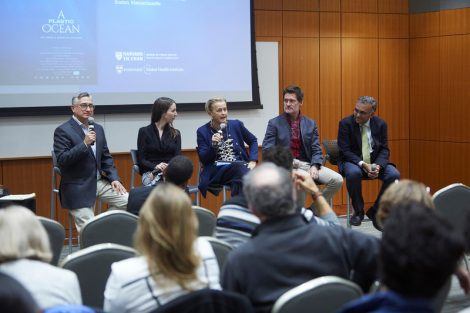November 27, 2017 – Our love affair with plastic—from water bottles, shopping bags, and drinking straws, to consumer product packaging—is taking a toll on the world’s oceans, and damaging the health of people, marine birds, and animals. The filmmakers and scientists behind a new documentary exploring this problem recently joined Harvard T.H. Chan School of Public Health community members for a film screening and panel discussion. Experts offered solutions for policymakers, as well as steps ordinary citizens can take to reduce plastic pollution.
The November 13, 2017 screening of A Plastic Ocean brought a packed audience of researchers, students, staff, and others to the Joseph B. Martin Conference Center. The event was sponsored by Harvard Chan School’s Office of the Dean and the Harvard Global Health Institute. The panel moderator was Adam Leipzig, the film’s producer. Harvard Business School alumnus Daniel Auerbach, MBA’87, who helped arrange the event, also spoke.
More than 8 million of the nearly 300 million tons of plastic produced every year—half of which is estimated to be for single use—are dumped in the world’s oceans, creating what some call an “underwater smog” of plastic debris. This debris can sicken seabirds and marine life that ingest it, potentially harming the health of people who consume affected animals.
Several years ago, journalist Craig Leeson, director of A Plastic Ocean, was filming whales underwater in what he considered a pristine part of the Indian Ocean off the coast of Sri Lanka when he discovered discarded plastic bottles on the ocean floor. Thus began a four-year documentary film project, for which he, working with a team of scientists, traveled to 20 locations around the globe to document the effects of plastic on marine ecosystems. The film describes the process by which plastic that ends up in the ocean breaks up over time to become tiny pieces known as microplastics. These microplastics enter the food chain, ushering toxins into the fatty tissues of fish and other animals, which may subsequently be consumed by people.
The Harvard Chan School screening featured a condensed version of the film, which was released in theaters in 2017.
Among the statistics cited by the panelists:
- According to the Container Recycling Institute, 100.7 billion plastic beverage bottles were sold in the U.S. in 2014, or 315 bottles per person.
- Annually approximately 500 billion plastic bags are used worldwide. More than one million bags are used every minute.
- A plastic bag has an average “working life” of 15 minutes.
- Packaging is the largest end-use market segment, accounting for just over 40% of total plastic usage.
In her welcoming remarks, Harvard Chan School Dean Michelle A. Williams said the event could hardly have been more timely. “It comes at a point when it’s increasingly clear that we must look to gatherings like this, and to people like you in this room, for leadership on critical issues like pollution and climate change,” Williams said. Communication among people from diverse backgrounds and experiences is the key to finding solutions. “Communication creates the necessary conditions for both sound policy and wise personal choices. In public health, this means speaking up and speaking out about what we know to be true,” she said. “We know climate change is linked to human activity. We know air and water pollution are harming people’s health—not in some remote time and place, but here and now. And we know that pollution of the oceans affects the entire planet, not just some exotic sea birds….Yet our scientific training teaches us to hedge where we could declare, to be precise at the expense of being clear, to provide information where we could instead share wisdom.”

Marine eco-toxicologist Jennifer Lavers, research scientist, Institute for Marine and Antarctic Studies at the University of Tasmania, discussed her work studying the impact of plastic pollution on the marine environment, particularly on seabirds. Seabirds pick up plastic believing it to be food and carry it back to their chicks, she said. In the film she displayed over 200 small pieces of plastic found inside one seabird that was only 90 days old. Seabirds are like the “canary in the coalmine,” she said, referring to when canaries were exposed to air in mines to see if it was safe for miners to work. Seabirds and marine life are “screaming at us to pay attention and do something,” she said
Panelist Ashish Jha, who is senior associate dean, research translation and global strategy and K.T. Li Professor of Global Health at the Harvard Chan School as well as director of the Harvard Global Health Institute, said scientists and other experts need to speak up with more certainty about ocean pollution and other environmental issues. When scientists fail to speak definitively about causes and effects of pollution, it makes the issue seem “distant” and people are less likely to take action to change it. “You have to make that connection to human health,” he said. “That’s what it takes to motivate people.”
The speakers agreed that new policies and systems that reward consumers for reducing their use of plastic, encourage recycling, and provide opportunities for businesses and consumers to earn revenue are critical. As an example, Leeson said a successful Plastic Bank organization pilot program has been set up in Haiti in which local residents collect discarded plastic and trade it in for cash.
Panelists suggested making simple lifestyle changes such as refusing to use single-use plastic items, passing up straws at restaurants, and informing store managers about unnecessary plastic packaging. “You start at home. That’s where you start to make a difference,” Leeson said.
Learn more
Watch the trailer: A Plastic Ocean Official Trailer – YouTube
For more about the film and the topic, see the Plastic Oceans Foundation
See the filmmaker’s article about the Harvard screening
See the Foundation’s list of what you can do to help
See the Foundation’s graphic on how plastic in the oceans impacts human health
photos: Kent Dayton
